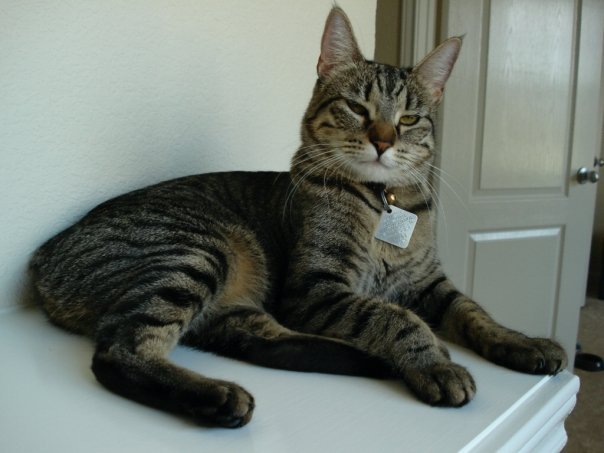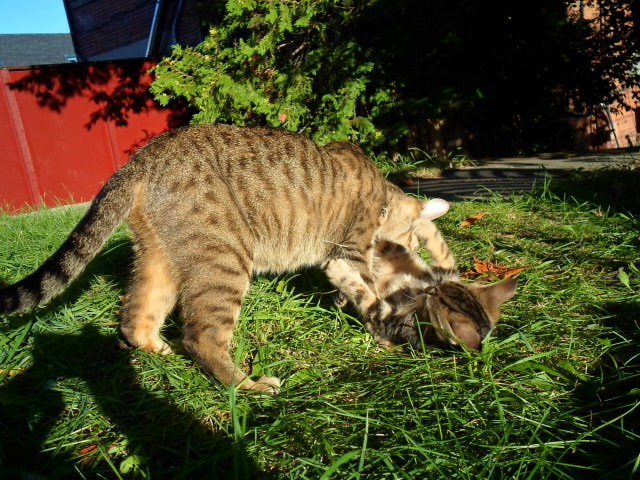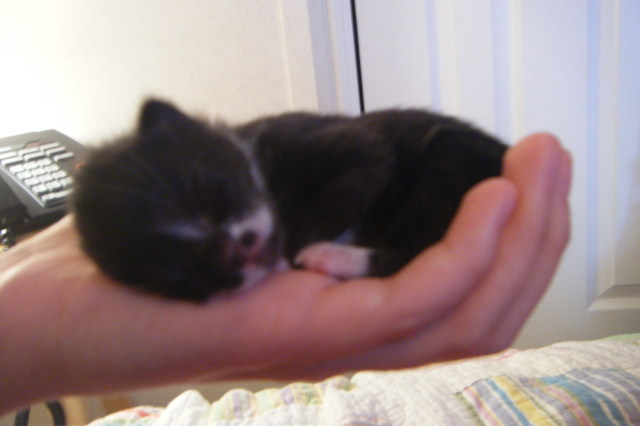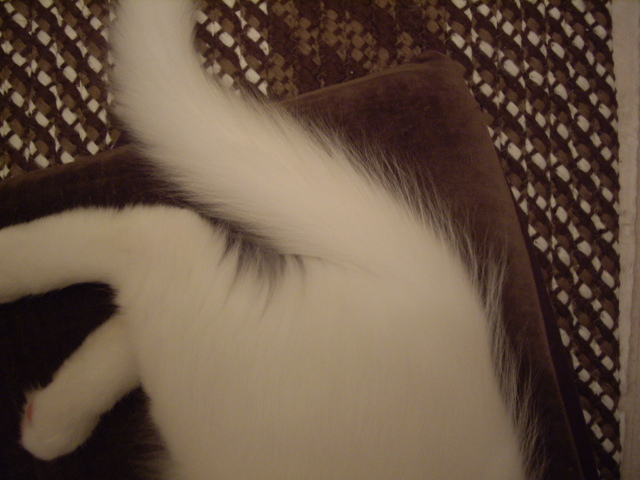QuestionMy very loving cats, Rasta and Sativa, show their affection by kisses. They will come up and touch their nose to ours. We have established this as a more preferred way of showing affection, and will let them gently rub their face in our occasionally after receiving these kisses, as we know it is a sign of affection. Sativa, love to show his affection but he caps it off occasionally with a love bite, the same love bites the cats use on each other. If he is really happy and loving towards us he will nip one at my chin, or try to groom and lick my nose as he does with the other cat. When I try to move away, he trys to hold my face still just as he does with Rasta. After the quick nose groom, he love bits me on my nose. (always with one tooth actually inside of my nostril and the other right outside because of the angle he nips from) It is annoying and painful at times. Every time I show discomfort, but I am seeing this is instinct for him. Do you know of any steps to showing him that humans do not prefer this kind of painful affection?
AnswerAmy,
Perhaps the simplest answer to a situation like this would be to plop kitty unceremoniously onto the floor whenever the love bites start. Cats are quite intelligent and it shouldn't take long for him to get the message. Domestic cats have many other ways of showing affection that don't include teeth so it's in your best interests to make it plain that biting isn't acceptable and it won't be tolerated before the behavior escalates in frequency or intensity. If the cats aren't spayed/neutered this can sometimes increase the likelihood that they'll bite and it's not always necessarily aggression related.
A holistic vet may be able to help with getting your kitty to keep his teeth to himself. Holistic vets are trained in conventional medicine as well as one or more alternative therapies like homeopathy, acupuncture, Reiki or massage to name a few options. My family vet is a holistic vet and she's incredible with my cats. I've seen some amazing results with homeopathic remedies given on their own or in combination with conventional treatments. It's possible that the cat's nipping because he's getting a bit over excited, some more natural treatments like homeopathy could possibly help keep this kitty calmer....
Spaying/neutering cats has many health and behavioral issues in addition to the obvious benefit of humane population control. There is an incredibly serious pet overpopulation issue that affect shelters and rescue organizations. Unfortunately many animal loving staff working for animal welfare organizations are forced to euthanize healthy, adoptable animals simply because they don't have the time, space or resources to devote to each animal until their forever family comes along to adopt them. The euthanasia rate for cats tends to be much higher than that of dogs, possibly because cats are seen as disposable or simply because pet parents aren't taking the simply step of controlling pet overpopulation by spaying/neutering their cats. It's important to keep the new mom indoors and away from intact male cats because she can become pregnant as early as 24-48 hours after giving birth. I would also recommend that you discuss spaying/neutering with anyone who wants to adopt one or more of these kittens, it's important that potential adoptive parents be prepared to accept the responsibility of providing their kitten(s) with appropriate care and spaying/neutering is definitely a part of ethical pet parenthood.
There are many good behavioral and medical reasons to spay/neuter our cats. Cats that have been spayed/neutered are prevented from getting uterine, ovarian or prostate cancers. The earlier in life that a cat is spayed/neutered the less likely s/he will be to develop prostate or breast cancers. Unspayed female cats are at risk of developing a potentially life threatening uterine infection called pyometra which causes the womb to fill with pus, if the uterus ruptures and spreads infection throughout the abdomen the cat's chances of survival are pretty low. The only treatment for pyometra is to perform an emergency spay, this procedure is much riskier than a routine spay because the cat is already quite sick which is associated with higher risks of anesthetic death and post surgical complications. The emergency spay is more complicated and time consuming so it tends to be quite a bit more expensive than a routine spay.
The leading cause of death in cats living in North America is euthanasia secondary to behavioral issues. This statistic is heart breaking because many behavioral issues can be prevented or minimized by spaying/neutering our cats.
Common behavioral problems including inappropriate elimination (urinating or defecating outside of the litter box), fighting with other cats (the resulting injuries from cat fights often require medical care because bite wounds tend to get badly infected forming abscesses which must be drained under anesthetic, flushed with sterile saline and treated with antibiotics), queens howling to advertise their availability to mate, tom cats caterwauling and fighting to win the right to mate with receptive queens and wandering over a large area are all issues which can be prevented by having the cat spayed/neutered before they reach sexual maturity. Behaviors like house soiling, biting or aggression can sometimes occur with cats that have been spayed/neutered however these behaviors are often related to things like improper introductions to new cats in the household, poor litter box hygiene, scented litter, and other issues which can be easily solved.
Ultimately spaying and neutering our cats is a responsible and ethical choice which saves countless lives each year. For pet parents that are having difficulty getting the money together for routine vet care I may be able to help find a solution to those issues. I keep an ever growing list of resources that may be willing to cover part or all of the cost of routine care like kitten vaccines and spay/neuter procedures. The only information that I ask for in these cases is that the pet parent provide the general area they are writing from - in Canada or the US the province or state is fine. Spaying and neutering helps cats to live longer, healthier lives and as kitty caregivers that love our pets we all want to have as much quality time as possible with our furry friends.
If the cats have been declawed it's not unusual to have issues with biting, mostly because the cat's primary defenses are gone. Contrary to popular belief declawing isn't simply a short permanent nail trim, the surgery involves amputation of bone, tendons and ligaments up to the first joint, it would be equivalent to cutting off our own fingers at the first joint.

 Reclusive kitten
QuestionMy cousin found an abandoned kitten and where s
Reclusive kitten
QuestionMy cousin found an abandoned kitten and where s
 my first kitten
QuestionQUESTION: hi im just wondering if u know what k
my first kitten
QuestionQUESTION: hi im just wondering if u know what k
 Cat Breed Identification?
Question
Playtime Pretty Girl
Hi there. &n
Cat Breed Identification?
Question
Playtime Pretty Girl
Hi there. &n
 I think my kittens got into our horses oats (with seed hulls)
Question
Our newborn baby :)
Hi there,
My kittens are
I think my kittens got into our horses oats (with seed hulls)
Question
Our newborn baby :)
Hi there,
My kittens are
 giardia coccidia
Questionthin, spiny guard hair
QUESTION: I took
giardia coccidia
Questionthin, spiny guard hair
QUESTION: I took